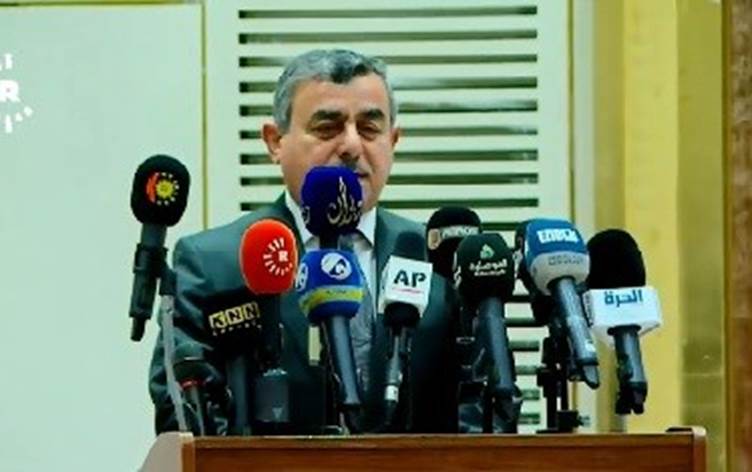
Head of Iraq's Council of Ministers Mahdi al-Alaq speaking at a conference on the Yezidi genocide Thursday. Photo: Rudaw TV
At the event organized by the Yezidi rights organization Yazda, Iraqi officials and foreign representatives all urged swift action to help Yezidis return to their homes and have security.
"Seventeen mass graves out of 73 discovered mass graves have so far been opened in Sinjar alone, with the support of the International Committee for Missing Persons and UNITAD," Mahdi al-Alaq, secretary general of Iraq's Council of Ministers, said in his speech at the conference in Baghdad.
By late May, the UN team UNITAD, which investigates crimes committed by the Islamic State (IS), had unearthed 12 mass graves of Yezidis in cooperation with Iraqi authorities. The number of such graves now stands at 17.
Alaq also announced that they have obtained permission from the Ministry of Higher Education and Scientific Research to establish the very first university in Shingal, as well as a museum and a hospital specializing in treating female and child victims of kidnapping and torture.
On August 3, 2014, ISIS militants swept across northern Iraq, along the way capturing the Yezidi homeland of Shingal. During their rule, they committed a genocide against the community, demanding that they either convert to Islam or die.
At the time, 6,417 Yezidis were kidnapped, according to head of the Kurdistan Regional Government's (KRG) Yezidi Women Rescue Office Hussein Koro. Since then, 3,509 have been rescued, and 2,908 have not been rescued, he said at a separate press conference Thursday.
Some of the missing are currently in the al-Hol camp in Syria, which hosts more than 70,000 ISIS members, according to Koro.
"I want to stress that we have confirmed information that a number of our women and children are in the al-Hol camp and other places," he said.
Koro said efforts to retrieve them from the camp in the Autonomous Administration of North and East Syria, known by Kurds as Rojava, have been unsuccessful. He said his agency sent a team there to no avail.
"Unfortunately, they had to return empty handed as they were not given the opportunity to do their job in the camp and elsewhere,” said Koro at the conference.
Five years since the genocide, the majority of Yezidis, over 300,000, still live in camps in the Kurdistan Region. And large numbers have already migrated abroad.
Shingal is a hotly-contested area between a number of forces. Both Baghdad and Erbil claim it, and Shingal is part of the disputed territories whose fate is to be settled by Article 140 of the Iraqi constitution.
In the area, a host of forces, including local Yezidi Peshmerga, Shia militias known as the Hashd and Kurdistan Workers’ Party (PKK)-affiliated Shingal Protection Forces are all there, with all vying for influence.








Comments
Rudaw moderates all comments submitted on our website. We welcome comments which are relevant to the article and encourage further discussion about the issues that matter to you. We also welcome constructive criticism about Rudaw.
To be approved for publication, however, your comments must meet our community guidelines.
We will not tolerate the following: profanity, threats, personal attacks, vulgarity, abuse (such as sexism, racism, homophobia or xenophobia), or commercial or personal promotion.
Comments that do not meet our guidelines will be rejected. Comments are not edited – they are either approved or rejected.
Post a comment